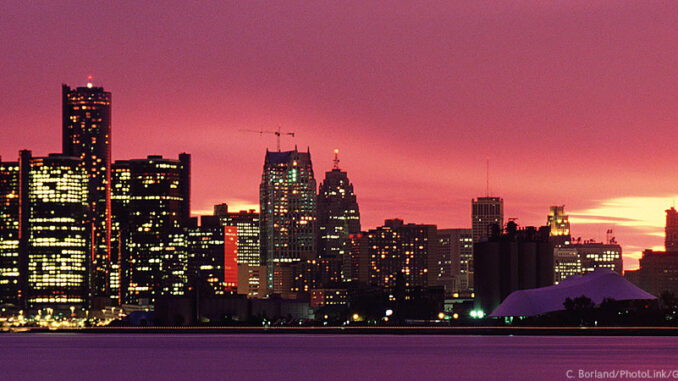
Back in the 1950s, Detroit, Michigan was a thriving city, the fourth largest in the United States. This success was due, in part, to the strength of the American automobile companies–Ford, General Motors and Chrysler. These multinational companies placed their headquarters and assembly plants there. But, the expansion of the auto industry into other cities, increased competition from foreign-made cars, the effects of the 2008 recession, and former government corruption has caused Detroit to experience a long period of decline. This July, the city filed for Chapter 9 bankruptcy.
What Happened?

Detroit’s history of economic strength has been in decline in recent years, but it has gotten worse in the most recent past.
How exactly does a city run out of money? The primary source of income for most cities is property tax. Everyone who owns a home is required by law to pay a percentage of the value of their home to the city in which they live. The population of Detroit has dropped from 1.8 million residents in its heyday, to around only 700,000 today. Approximately 78,000 homes and office buildings are empty, which means no one is paying taxes on those properties. Of those who do own homes, only a reported 53 percent paid taxes in 2011. For many years, Detroit paid its bills (salaries for its 10,000 state employees and services for its citizens) with borrowed money. It is currently $15 billion in debt, and needs to pay $246 million a year just to keep up.
The quality of life for Detroit residents is being threatened as the city continues to fail. Only 40 percent of the streetlights work, and police can take up to an hour to respond to an emergency call. Trash is reportedly piling up in certain areas because the city cannot afford to repair garbage trucks.
Getting Help
In March, the city of Detroit hired an Emergency Manager, Kevyn Orr to help with a restructuring plan. He and Mayor Rick Snyder proposed a deal with several creditors to accept ten cents for every dollar owed. When these negotiations failed, Snyder filed papers for bankruptcy. However, Judge Rosemarie Aquilina ordered the city to withdraw, saying that doing so violated the state constitution because the pensions (retirement money for state employees and one of the city’s major creditors) are protected under law. Michigan Attorney General Bill Schuette immediately filed an appeal.
While Detroit is the largest city to file for bankruptcy, it is not the first. For instance, in 2012, three California cities–Mammoth Lakes, San Bernardino and Stockton–all applied and received assistance. At least ten other U.S. cities have been identified as facing serious financial crisis. In 1973, New York City was granted a $2.3 billion rescue loan, despite then President Ford’s threat to veto. With the national debt at an all-time high and the automatic sequester cuts put into place in March, Detroit is unlikely to receive a federal government bailout.
